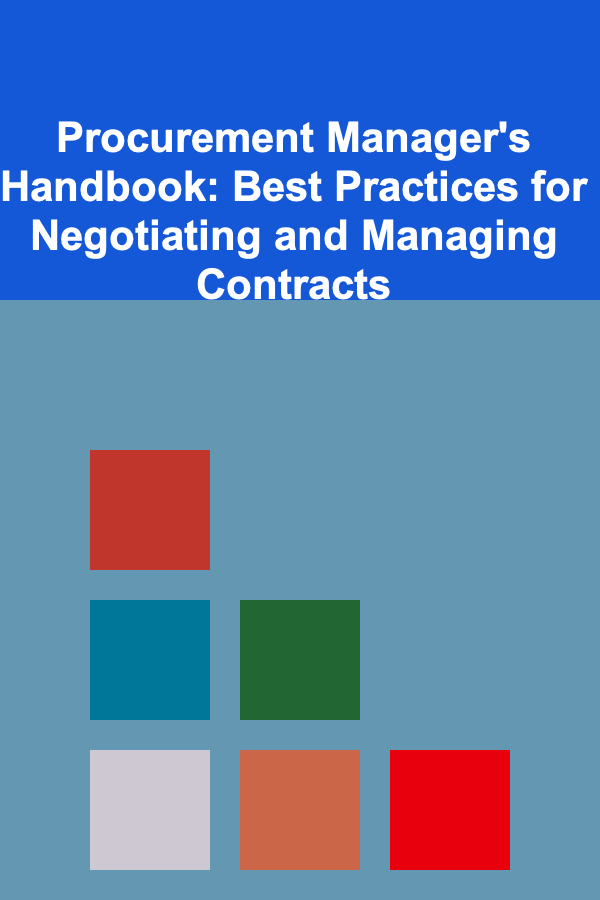
Procurement Manager's Handbook: Best Practices for Negotiating and Managing Contracts
ebook include PDF & Audio bundle (Micro Guide)
$12.99$8.99
Limited Time Offer! Order within the next:

The role of a procurement manager is pivotal in ensuring that an organization obtains goods and services at the best value. One of the most critical aspects of procurement management is contract negotiation and management. In a world where businesses increasingly rely on external suppliers for essential goods and services, the ability to negotiate favorable terms and efficiently manage contracts can lead to significant cost savings, enhanced operational efficiency, and long-term partnerships. This actionable guide will dive into the best practices that procurement managers should employ when negotiating and managing contracts.
Preparation: Laying the Groundwork for Successful Negotiation
Effective negotiation and contract management start long before the actual discussions begin. Preparation is key, as it allows procurement managers to approach the process with a clear understanding of their goals, the supplier's objectives, and potential risks.
a. Understand Organizational Needs and Objectives
Before engaging in any negotiations, procurement managers must have a solid understanding of the organization's strategic goals and specific needs. This includes:
- Identifying the key business requirements for the goods or services.
- Understanding the budget constraints and cost expectations.
- Evaluating the timelines for delivery and any critical deadlines.
By aligning procurement goals with organizational needs, procurement managers can ensure that any contract negotiated serves both immediate and long-term objectives.
b. Know Your Supplier Market
Having an in-depth understanding of the supplier market is critical to successful negotiation. This includes:
- Researching potential suppliers and their capabilities.
- Understanding the market price for goods or services.
- Knowing industry trends, technological advancements, and potential shifts that may impact the cost or quality of goods.
This knowledge arms procurement managers with the information needed to negotiate from a position of strength and to understand the potential risks and benefits associated with different suppliers.
c. Identify Potential Risks
In any contract negotiation, risk mitigation is a top priority. Risks may include:
- Delivery delays.
- Quality discrepancies.
- Regulatory changes.
- Currency fluctuation or price hikes.
Procurement managers must analyze potential risks early in the process, so they can negotiate terms that protect the organization from unforeseen issues. This may involve incorporating clauses for penalties in case of non-compliance or setting clear delivery timelines.
Negotiating Contracts: Key Best Practices
Once the groundwork is laid, the actual negotiation process begins. Procurement managers must employ a variety of strategies to ensure that the terms and conditions of the contract are favorable for their organization, while also maintaining a strong, collaborative relationship with the supplier.
a. Build a Collaborative Relationship with Suppliers
The best contracts aren't just about winning the negotiation---they're about building long-term, mutually beneficial relationships. Procurement managers should approach negotiations with the goal of creating value for both parties. This includes:
- Building rapport and open lines of communication with suppliers.
- Understanding the supplier's concerns, goals, and constraints.
- Offering flexibility when possible (e.g., extended payment terms or adjusting delivery schedules).
A cooperative approach to negotiations often leads to better outcomes, especially in cases where the supplier can provide value in unexpected ways, such as offering early discounts or prioritizing orders.
b. Negotiate Price, Payment Terms, and Delivery Schedules
Three of the most important elements in contract negotiations are the price, payment terms, and delivery schedules. Procurement managers should focus on securing favorable terms in each of these areas:
- Price: Seek competitive pricing, but also look beyond the base price. Factor in quality, after-sales support, and the long-term value provided by the supplier.
- Payment Terms: Negotiate for favorable payment terms that align with the company's cash flow cycle. This could include longer payment periods, discounts for early payments, or installment payments.
- Delivery Schedules: Ensure that delivery timelines align with the company's needs. Build flexibility into delivery terms, in case of unforeseen circumstances or changes in demand.
c. Incorporate Key Contract Clauses for Protection
Effective contracts include well-thought-out clauses that protect both the buyer and supplier. Common contract clauses to include:
- Indemnity and Liability Clauses: Specify the conditions under which a party will be liable for damages or losses and include indemnity clauses to protect against third-party claims.
- Force Majeure: Define the circumstances under which the supplier is not liable for non-performance, such as natural disasters or unexpected global events.
- Termination Clause: Define the terms under which either party can terminate the contract and what penalties or compensations apply.
- Performance Metrics and Penalties: Specify key performance indicators (KPIs) and outline the penalties if the supplier fails to meet agreed-upon standards (e.g., late deliveries or defective goods).
By including these protective clauses, procurement managers can minimize potential risks and ensure that the organization is safeguarded against common pitfalls.
d. Leverage Data and Technology for Negotiation Insights
Data plays a significant role in contract negotiations. Procurement managers should leverage procurement analytics tools and software to:
- Analyze historical pricing data and trends.
- Evaluate supplier performance and delivery metrics.
- Review market data to benchmark supplier prices and terms.
This data-driven approach provides concrete evidence to support negotiation points and strengthens the procurement manager's position at the bargaining table.
Managing Contracts: Ongoing Oversight and Relationship Building
The negotiation doesn't end when the contract is signed. Procurement managers must actively manage contracts throughout their lifecycle to ensure compliance, track performance, and resolve any issues that may arise.
a. Establish Clear Performance Metrics
Once the contract is in place, procurement managers must set up a system to track supplier performance. This involves:
- Defining key performance indicators (KPIs) for quality, delivery times, customer service, and other critical factors.
- Regularly reviewing supplier performance against these metrics to ensure that the supplier is fulfilling its obligations.
Establishing clear expectations up front will allow both parties to measure success and address any issues promptly.
b. Regularly Monitor Compliance
Contract compliance is an ongoing process that requires diligent oversight. Procurement managers should:
- Ensure that the terms of the contract are being adhered to, including delivery times, quality standards, and payment terms.
- Address any issues of non-compliance as soon as they arise, working with the supplier to find a resolution.
- Document instances of non-compliance and take necessary steps to enforce the terms of the contract, including invoking penalty clauses if applicable.
A proactive approach to compliance ensures that the organization can maintain its relationship with the supplier while holding them accountable for agreed-upon terms.
c. Manage Contract Renewals and Amendments
At the end of the contract term, procurement managers should begin preparing for renewals or amendments well in advance. This includes:
- Reviewing supplier performance and evaluating whether the relationship should continue.
- Assessing whether the terms of the contract still meet the organization's needs, or if adjustments are necessary.
- Negotiating any changes or renewals before the contract expires to avoid disruptions.
By addressing these points early on, procurement managers can ensure a smooth transition between contract periods, avoiding any gaps in supply or service.
d. Foster Long-Term Supplier Relationships
Building and maintaining strong relationships with suppliers is essential to long-term procurement success. Procurement managers should:
- Communicate regularly with suppliers, discussing performance, challenges, and opportunities for improvement.
- Seek to resolve conflicts collaboratively rather than confrontationally.
- Offer feedback and acknowledge suppliers who meet or exceed expectations.
Strong relationships with suppliers not only benefit negotiations but can also result in preferential treatment, cost reductions, and better overall service.
Conclusion: The Key to Effective Procurement Management
Procurement managers are responsible for much more than just purchasing goods and services. They play a strategic role in ensuring that their organizations get the best value while maintaining strong, productive supplier relationships. Successful contract negotiation and management require preparation, strategic thinking, and ongoing oversight. By following the best practices outlined in this guide, procurement managers can ensure that their contracts deliver value, mitigate risks, and build long-lasting partnerships with suppliers.
Reading More From Our Other Websites
- [Personal Finance Management 101] How to Create a Realistic Retirement Plan in Your 20s
- [Home Pet Care 101] How to Care for a Pet After Surgery: A Step‑by‑Step Guide
- [Organization Tip 101] How to Sort and Purge Your Shoe Collection
- [Personal Care Tips 101] How to Select the Perfect Concealer Shade and Application Technique for Your Skin Tone and Type
- [Home Lighting 101] How to Create a Cozy Atmosphere with Warm Lighting
- [Reading Habit Tip 101] Tech-Free Pages: Creating a Distraction-Free Reading Routine in the Digital Age
- [Home Holiday Decoration 101] How to Craft Your Own Holiday Wreath for a Personalized Touch
- [Beachcombing Tip 101] From Shells to Sea Glass: Essential Tools for the Beachcomber
- [Home Holiday Decoration 101] How to Hang Christmas Garland Perfectly on Your Fireplace
- [Tie-Dyeing Tip 101] Sustainable Tie-Dye: Using Natural Dyes and Eco‑Friendly Techniques

10 Creative DIY Birthday Party Themes and Decorations You'll Love
Read More
How to Create a Checklist for Gathering Data from Online Sources
Read More
How to Maintain Your Home's Appliances for Better Efficiency
Read More
How To Support Reforestation Efforts for Wildlife
Read More
How to Make Homemade Pizza Dough
Read More
Metal Detecting for Native American Artifacts: 10 Safety Tips
Read MoreOther Products

10 Creative DIY Birthday Party Themes and Decorations You'll Love
Read More
How to Create a Checklist for Gathering Data from Online Sources
Read More
How to Maintain Your Home's Appliances for Better Efficiency
Read More
How To Support Reforestation Efforts for Wildlife
Read More
How to Make Homemade Pizza Dough
Read More